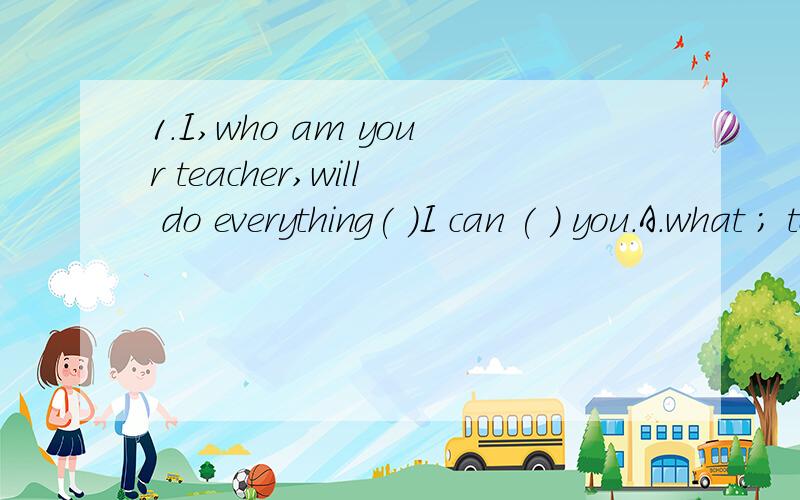1.I,who am your teacher,will do everything( )I can ( ) you.A.what ; to helpB.which ; helpC.that ; to helpD.who ; help2.Letter boxes are much more ( ) in the UK than in the US,where most people have a mailbox instead.A.commonB.normalC.ordinaryD.usual
来源:学生作业帮助网 编辑:作业帮 时间:2024/12/01 11:55:37

1.I,who am your teacher,will do everything( )I can ( ) you.A.what ; to helpB.which ; helpC.that ; to helpD.who ; help2.Letter boxes are much more ( ) in the UK than in the US,where most people have a mailbox instead.A.commonB.normalC.ordinaryD.usual
1.I,who am your teacher,will do everything( )I can ( ) you.
A.what ; to help
B.which ; help
C.that ; to help
D.who ; help
2.Letter boxes are much more ( ) in the UK than in the US,where most people have a mailbox instead.
A.common
B.normal
C.ordinary
D.usual
1.I,who am your teacher,will do everything( )I can ( ) you.A.what ; to helpB.which ; helpC.that ; to helpD.who ; help2.Letter boxes are much more ( ) in the UK than in the US,where most people have a mailbox instead.A.commonB.normalC.ordinaryD.usual
C 首先everything后面是个定语从句,定于从句有不定代词something,everything等的时候只能用that,然后这是一个that引导的定语从句,从句部分是that I can 后面的括号用不定式to do 做目的状语.其实这是个常用句型:I will do everything that I can to do...
A 这是近义词辨析.common指“共同的,一般的,普遍的”侧重于事物的普遍性和一般性.normal是“正常的”,ordinary是“普通的”,说“普通人(ordinary people)”就可以.usual是跟unusual(不寻常)相反,侧重说“没有什么特别”
理解吗?
第一题选A,因为先行代词是人称,而且情态动词后要给动词原形,所以用排除法可以得出答案。第二题选A,它表示一种现象的比较。以上均为我个人的看法,不是权威答案,仅做参考
C;A
1.C,everything后跟that,是个规律。2.A